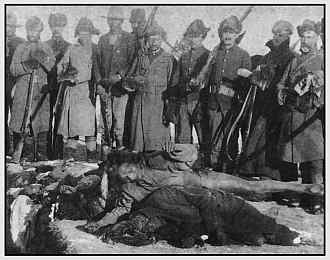"I can't take one more of these headlines," said Joan Redfern, a member of the Lakota Sioux tribe who lives in Hollister. We met at First Street Coffee to talk while we scanned Internet stories. "Haven't any of these people ever heard of the Massacre at Sand Creek in Colorado, where Methodist minister Col. Chivington massacred between 200 and 400 Cheyenne and Arapaho Indians, most of them women, children, and elderly men?"
Chivington specifically ordered the killing of children, and when he was asked why, he said, "Kill and scalp all, big and little; nits make lice."
At Wounded Knee Creek in South Dakota, the U.S. 7th Cavalry attacked 350 unarmed Lakota Sioux on December 29, 1890. While engaged in a spiritual practice known as the "Ghost Dance," approximately 90 warriors and 200 women and children were killed. Although the attack was officially reported as an "unjustifiable massacre" by Field Commander General Nelson A. Miles, 23 soldiers were awarded the Medal of Honor for the slaughter.


2 comments:
An excellent, though profoundly sad, point. Puts me in mind of the old saw about the difference between a "massacre" and a "battle": a "massacre" is any conflict with Indians where at least one white person is killed, a "battle" is any engagement in which Indian elders, women and children are mowed down by the Army.
Writerfella here --
The actual differences between the terms 'massacre' and 'battle' are these: 'massacre' involves people who are innocent of the attacker's intent; 'battle' means they at least are cognizant of the conflict that has come home to roost. The 'Indian Wars' were fought not over 'territorial imperative' but rather over who could own the land. Devastate the current occupiers of the land, and the land was yours. Natives occupied the land out of a balance between actual combat and ritualized combat, as is the case for animal species who exist in ecological competition for territory. EuroMan figured it all quite differently and so war was inevitable. Species do not compete to the destruction of those they displace, but EuroMan entered the equation from the standpoint that he would eliminate any and all who competed with him. That principle still is alive now and, every so often, it rises up in attack and those attacked are left to puzzle over just why it all occurred...
All Best
Russ Bates
'writerfella'
Post a Comment